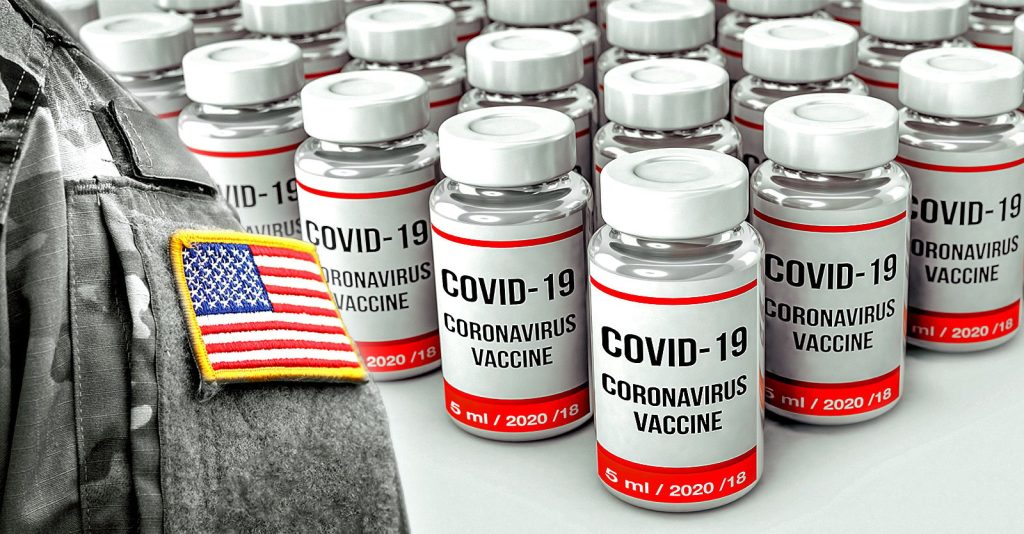Thousands of service members faced discharge without benefits after the Pentagon unlawfully mandated COVID-19 vaccines without safety or efficacy data. Accountability advocates discuss leveraging existing rules to get medical care for vaccine injuries and demand transparency on mismanaged health data and ethical breaches.

Guest post BY PAM LONG
Service members and veterans earlier this month discussed an update on the Declaration of Military Accountability in an X Space hosted by Brad Miller, on the platform formerly known as Twitter, and his colleagues.
The Defender previously reported on the military movement, launched in 2024, to hold the U.S. Department of Defense (DOD) accountable for the unlawful mandate of the experimental COVID-19 vaccines and the subsequent involuntary separations of thousands of service members, many of whom with less-than-honorable discharges — which will negatively affect their access to benefits.
This article focuses on compensation from the DOD and the U.S. Department of Veterans Affairs (VA) for vaccine adverse reactions and toxic exposures.
Service members who received a COVID vaccine from DOD
Whistleblowers have reported significant increases in cardiac conditions, cancers and neurological disorders diagnosed among service members in the Defense Medical Epidemiology Database (DMED) after the DOD enacted its COVID-19 vaccine mandate.
The DOD claimed the DMED health surveillance data from 2016-2020 was flawed, and subsequently adjusted the data, which no longer report significant increases in COVID-19-vaccine-induced diseases.
As of 2024, Congress has not held an oversight hearing to investigate the Pentagon on the DMED data discrepancy.
Service members who participated in the X Space hosted by Miller reported the military healthcare system is ordering genetic tests when they attempt to get a diagnosis for suspected COVID-19 vaccine reactions.
Members speculate whether these tests could disqualify them for service-connected compensation claims, or deter them from testing for symptoms of toxic environmental exposures.
However, the genetic tests are likely irrelevant when it comes to compensation. Service members are protected by their medical exam records, which were required before they entered the military to document a baseline of good health without pre-existing conditions.
If members were harmed by a vaccine adverse reaction or other toxic exposures, the resulting chronic condition can still qualify for service-connected benefits — even if the military does not establish causation.
The VA’s Presumption of Soundness explains why:
“In essence, the presumption states that the VA cannot simply deny a claim because it believes that a veteran’s disability pre-dated his service. The Presumption of Soundness is explained in 38 U.S.C 1111, which states:
“‘For the purposes of section 1110 of this title, every veteran shall be taken to have been in sound condition when examined, accepted, and enrolled for service, except as to defects, infirmities, or disorders noted at the time of the examination, acceptance, or enrollment, or where clear and unmistakable evidence demonstrates that the injury or disease existed before acceptance and enrollment and was not aggravated by such service.’”
Those service members who may experience a delayed reaction or illness years from now can access service-connected benefits under The PACT Act (2022) within the provision of Toxic Exposure Risk Activities.
Service members who were exposed to toxins such as jet fuels, chemicals in water and burn pits can request a toxic exposure screening, and disability compensation will be presumptively construed as service-connected without a determination of causation.
The VA has expanded the list of presumptive conditions caused by known toxic exposures in Vietnam, the Gulf War and Afghanistan.
Title 38 U.S. Code Veterans Benefits, Section 1168, mandates medical evaluations for service members who submit a claim for service-connected disability compensation with insufficient evidence, to take into consideration both Toxic Exposure Risk Activities and synergistic effects of combined exposures with a “at least as likely as not” burden of proof:
“(a) Medical Examinations and Medical Opinions.-(1) Except as provided in subsection (b), if a veteran submits to the Secretary a claim for compensation for a service-connected disability under section 1110 of this title with evidence of a disability and evidence of participation in a toxic exposure risk activity during active military, naval, air, or space service, and such evidence is not sufficient to establish a service connection for the disability, the Secretary shall-
“(A) provide the veteran with a medical examination under section 5103A(d) of this title; and
“(B) obtain a medical opinion (to be requested by the Secretary in connection with the medical examination under subparagraph (A)) as to whether it is at least as likely as not that there is a nexus between the disability and the toxic exposure risk activity.
“(2) When providing the Secretary with a medical opinion under paragraph (1)(B) for a veteran, the health care provider shall consider-
“(A) the total potential exposure through all applicable military deployments of the veteran; and
“(B) the synergistic, combined effect of all toxic exposure risk activities of the veteran.”
Veterans who received a COVID vaccine from VA
Dr. Crisanna Shackelford tweeted the alarming data obtained via a Freedom of Information Act request to the Veterans Healthcare Administration database known as Legacy.
According to the data, tens of thousands of veterans were hospitalized within six months following the COVID-19 vaccine.
The current VA policy (VA Standard Operating Procedure) asserts that vaccines and medications are not classified as Toxic Exposure Risk Activities , with the rationale being a lack of evidence on resulting long-term adverse health effects.
This current VA policy conflicts with emerging studies that establish pathogenic mechanisms and inflammatory components in the novel mRNA vaccine technology: spike protein (Lesgards et al., 2023), lipid nanoparticles (Ndeupen et al., 2021), and both spike protein and lipid nanoparticles (Palmer, 2023).
Despite the current disconnect between the presumptive compensation from the PACT Act legislation and the exclusionary compensation policy of the VA, veterans can be compensated for harms resulting from VA healthcare.
A VA whistleblower reported that most veterans are unaware of their rights in Title 38 U.S. Code, Section 1151:
“You may be eligible if you suffered an added disability, or your existing disability got worse, as the direct result of any of the reasons listed here. The added disability (or disability that got worse) must not have been a reasonably expected result or complication of treatment.
“At least one of these must have led directly to an added disability or to your disability getting worse:
“VA carelessness or negligence, or
“VA medical or surgical treatment, or
“A VA health exam, or
“A VA vocational rehabilitation course (under 38 U.S.C. Chapter 31), or
“VA compensated work therapy (CWT) (under 38 U.S.C. 1718).”
Scope and depth of COVID vaccine injuries in the military
The Epoch Times reported that 20 of 30 service members who were administered the COVID-19 vaccine claimed they were injured by it.
The potential for force-wide reduction in military readiness caused by the experimental COVID-19 vaccine mandate is the basis for the Declaration of Military Accountability organizers’ demand for public congressional committee hearings with DOD leadership on the health of the U.S. armed forces.
Under the X name Drew Outstanding, a former Army soldier described his COVID-19 vaccine reaction in 2021. It started with flu-like symptoms, progressed to muscle weakness, and escalated into paralysis diagnosed as Guillain-Barré syndrome.
Once an athlete participating in Spartan Races — obstacle races with the hardest terrain and heaviest carries in competitive sports — two years later Drew Outstanding is still recovering with a cane, walker and wheelchair.
He shared this call to action:
“The right people are not speaking up and doing the right thing — the ones that projected this so much, the media, the politicians, the so-called experts.
“I’m here for the fight. Let me know how I can help. We need to get some accountability. My two things are, first, to remove the legal liability [shield] that these pharmaceutical companies have. I will keep fighting until that gets removed. Are we still in the pandemic? Do we still need the EUA right now? It doesn’t seem like it.
“And then all the soldiers, all the service members who got a less than honorable discharge for not taking it, I want to fight for them as well. Those are my two big things.”
Follow the Children’s Health Defense Military Chapter for updates on accountability for unlawful vaccine mandates for service members and veterans.
Pam Long is graduate of USMA at West Point and is an Army Veteran of the Medical Service Corps.
“© [Article Date] Children’s Health Defense, Inc. This work is reproduced and distributed with the permission of Children’s Health Defense, Inc. Want to learn more from Children’s Health Defense? Sign up for free news and updates from Robert F. Kennedy, Jr. and the Children’s Health Defense. Your donation will help to support us in our efforts.

























So a bunch of lawyers would decide whether a medical procedure was appropriate or not. Thanks, but most of us would much prefer letting members of the medical and scientific community rule whether legal procedures and decisions are appropriate.